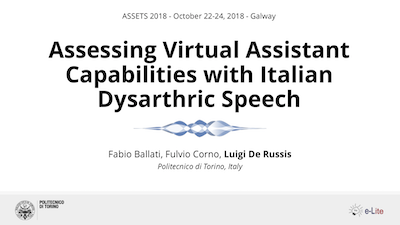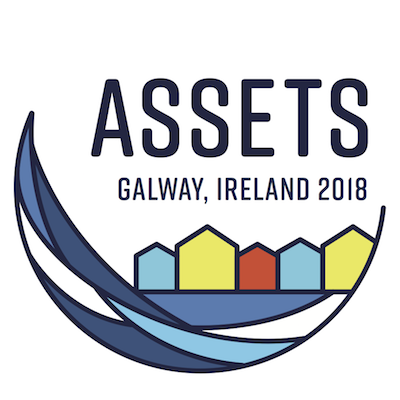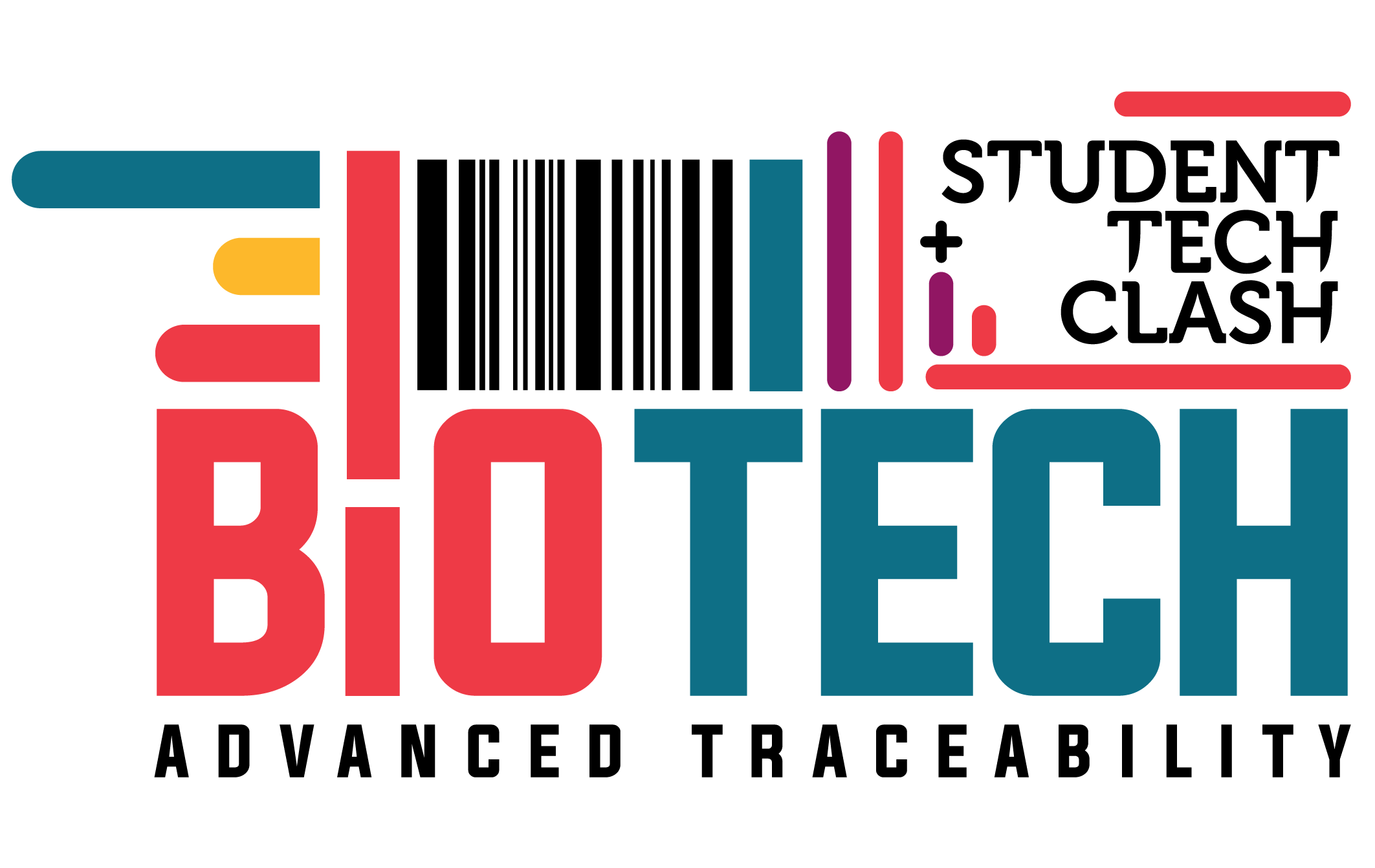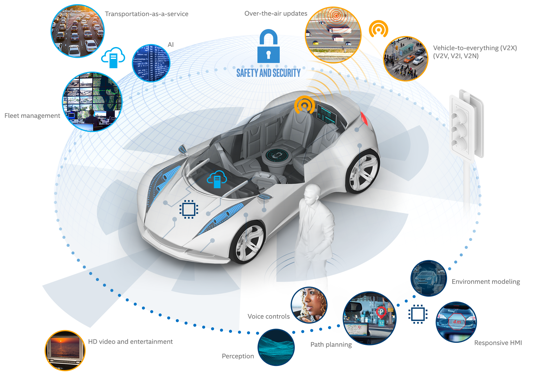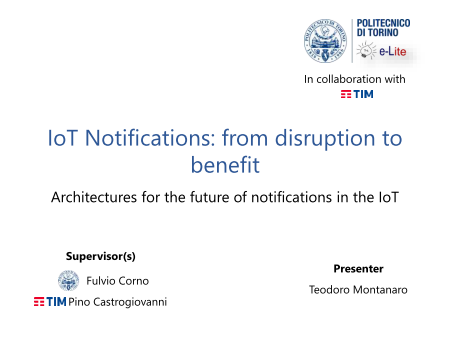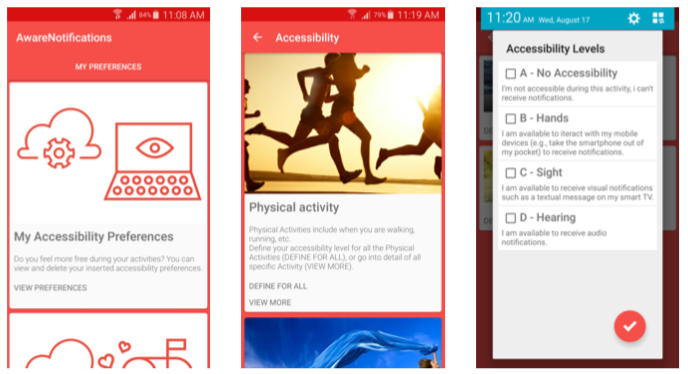- Details
On October 22, 2018, Luigi De Russis presented the paper "Assessing Virtual Assistant Capabilities with Italian Dysarthric Speech" at the audience of ACM ASSETS 2018 (International ACM SIGACCESS Conference on Computers and Accessibility), held in Galway (Ireland).
The paper investigates to which extent people with ALS-induced dysarthria can be understood and get consistent answers by three widely used smartphone-based assistants, namely Siri, Google Assistant, and Cortana. In particular, the paper focuses on the recognition of Italian dysarthric speech, to study the behavior of the virtual assistants with this specific population for which there are no relevant studies available. Results see Google Assistant to outperform the other two virtual assistants, for what concerns both the accuracy in transcription and the coherence of the provided answers.
- Details
The e-Lite group will participate at the ACM SIGACCESS Conference on Computers and Accessibility (ACM ASSETS 2018), which will take place in Galway, Ireland, on October 22-24. The ACM ASSETS 2018 conference is the premier forum for presenting innovative research on mainstream and specialized assistive technologies, accessible computing, and assistive applications of computer, network, and information technologies.
Luigi De Russis will present two papers, one of them being the GNomon paper published in 2017 in the ACM Transactions on Accessible Computing. More details on GNomon can be found at the dedicated page.
The other paper is entitled "Assessing Virtual Assistant Capabilities with Italian Dysarthric Speech" and is co-authored by Fabio Ballati and Fulvio Corno. The paper investigates to which extent people with ALS-induced dysarthria can be understood and get consistent answers by three widely used smartphone-based assistants, namely Siri, Google Assistant, and Cortana. In particular, the paper focuses on the recognition of Italian dysarthric speech, to study the behavior of the virtual assistants with this specific population for which there are no relevant studies available. More details on this work are available in the Virtual Assistants and Dysarthria page.
- Details
On October 10th, Reply organized their "Student Tech Clash" on the topic of Biotech Advanced Traceability, a competition among students of 5 different European Universities: Politecnico di Torino, Politecnico di Milano, Queen Mary University of London, RWTH Aachen University and TU Delft University.
At Polito more than 80 students, coming from Computer Engineering, Electronic Engineering, Mechanical Engineering, Management Engineering, Cinema and Media Engineering, Biomedical Engineering, Production Engineering and more, enrolled in 4-student groups and worked all day long on the proposed Case Study Challenges, by working either on the Fashion sector or in the Food industry. Among all student teams, one all-female team already won the "funniest picture" award.
At the beginning of the event, Fulvio Corno gave a short welcome speech on behalf of the Rector and of the School of Computer Engineering. The final results of the challenge will be available on October 19.
- Details
A team of Computer Engineering students from Politecnico di Torino successfully participated to the "1° MEC Hackathon & Conference" event, that took place in Torino (at I3P) on Tuesday, Semptember 18, 2018 and that was supported by enterprises such as Intel, Vodafone, Saguna, Hawei.
The theme of the Hackathon was focused on the MEC (Multi-access Edge Computing) standard, developed by ETSI as a platform for developing distributed applications, that integrate cloud component, edge nodes, and terminal devices. In particular, the hackathon focused on applications in the Automotive field of the MEC protocols and infrastructure.
Five brave Politecnico students accepted the challenge posed by the hackathon: they are Fabio Cermelli, Eugenio Gallea, Lorenzo Moro, Stefano Roagna, and Nunzio Turco. Fabio and Lorenzo are also members of the IEEE Eta-Kappa-Nu association. Working together and combining their specific individual skills, they built a prototype of a system, called Jarvis, that they describe as follows:
"Our idea aims at being a help for the drivers, especially the novice ones, end in particular to notify possible dangers in upcoming intersections. By exploiting the MEC technology we may notify, nearly in real time, the drivers of other approaching vehichle that could constitute a danger. The intelligence that we added to the infrastructure allows us to provede the data for computing vehicle position and speed, and to detect when such situations might happen. The MEC is then used also to broadcast a warning to all vehicles in a certain area.”
The project has been awarded the possibility of implementing and testing it on the “Smart Roads” infratstructure of the City of Torino.
Un team di studenti di Ingegneria Informatica del Politecnico di Torino ha partecipato con successo all'evento "1° MEC Hackathon & Conference" tenutosi a Torino (presso I3P) martedì 18 settembre 2018 e supportato da aziende come Intel, Vodafone, Saguna, Hawei.
Il tema della Hackathon era lo standard MEC (Multi-access Edge Computing) sviluppato da ETSI come piattaforma per lo sviluppo di applicazioni distribuite, che integrino componenti cloud, nodi edge e dispositivi terminali. In particolare, l'hackathon si concentrava sulle applicazioni in campo Automotive dei protocolli e dell'infrastruttura MEC.
Cinque coraggiosi studenti del Politecnico hanno raccolto la sfida lanciata dall'hackathon: si tratta di Fabio Cermelli, Eugenio Gallea, Lorenzo Moro, Stefano Roagna e Nunzio Turco. Fabio e Lorenzo sono anche membri dell'associazione IEEE Eta-Kappa-Nu. Lavorando insieme e combinando le proprie competenze specifiche, hanno costruito il prototipo di un sistema, denominato Jarvis, che descrivono così:
"La nostra idea ambisce ad essere un aiuto per i guidatori, soprattutto quelli alle prime armi, in particolare per consentire la notifica di eventuali pericoli nelle prossimità di un incrocio. Sfruttando la tecnologia MEC possiamo avvisare quasi real-time gli autisti di eventuali altri veicoli in avvicinamento che costituirebbero un pericolo. L’intelligenza aggiunta da noi all’infrastruttura ci permette di fornire i dati relativi al veicolo (posizione e velocità) al fine di calcolare quando si potrebbero verificare tali situazioni, mentre quello per il quale utilizziamo MEC è una sorta di avviso a tutti i veicoli in una certa area.”
Il progetto è stato premiato con la possibilità di essere implementato e testato sull’infrastruttura “Smart Roads” del Comune di Torino.
- Details
Teodoro Montanaro achieved his Ph.D. title in Computer and Control Engineering on Monday, September 10, 2018, by defending his dissertations in front of an evaluation commission composed of 3 external and 2 internal professors.
Many thanks to external referee and to committee members for their support and feedback.
Warm congratulations to Teo and best wishes for his future as a researcher.
- Details
With the increase of connected devices and online services, the number of notifications received by each person is growing. Although notifications are useful to inform users about important information such as new messages and events, the continuous interruptions, the notification duplication, and the rigid delivery can be sources of discomfort.
The paper AwareNotifications: Multi-Device Semantic Notification Handling with User-Defined Preferences, published in the Journal of Ambient Intelligence and Smart Environments, presents AwareNotifications, an intelligent system to overcome these issues. AwareNotifications is based on user-defined preferences to manage multi-device notifications, powered by Semantic Web technologies. By directly exploiting user preferences in the semantic reasoning process, the system is able to identify suitable device(s), modality, and moment(s) to deliver the incoming user notifications. The work was evaluated in a user study with 15 participants, in which we compared our system with the "traditional" notification delivery system, available in contemporary mobile and IoT settings. The study confirmed the perceived effectiveness of AwareNotifications, and provides insights to further improve the system.


